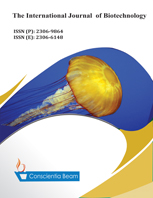The Study of Inhibitory Effects of Satureja Khuzestanica Essence against Mexa and Mexr Efflux Genes Ofpseudomonas Aeruginosa by Rt-Pcr
DOI:
https://doi.org/10.18488/journal.57/2015.4.1/57.1.1.8Abstract
Background: Pseudomonas aeruginosa is an opportunistic pathogen that can cause severe hospital-acquired infections, especially in immunocompromised hosts. P.aeruginosa for its resistance to antibiotics. Efflux pump is one of the several mechanisms involved in intrinsic resistance of these bacteria to antibiotics. It has been revealed that deletion of genes encoding the components of MexAB–OprM of efflux system, in wild-type P. aeruginosa, confers hypersusceptibility to a variety of antimicrobial agents. Antimicrobial and antifungal properties of some herbal medicines were reported. Objectives: In this study the effect of Saturejakhuzestanica extract, an endemic plant of Iran, on the expression level of mexA, and mexR genes in P. aeruginosa were investigated. Materials and Methods: In this study, MIC was determined for P. aeruginosa. Then, bacteria were treated with S. khuzistanica extract. MexA, mexR and gyrA genes expression in treated and non-treated bacteria, before and after treatment was evaluated using RT-PCR technique. Results: Surprisingly, the expression level of mexA and mexR genes was decreased in the presence of S. Khuzestanica. However, the expression of gyrAgene that was used as an internal control was not altered before and after treatment with this herb. Based on the results, S. Khuzestanica could play a, major role in lowering the P. aeruginosa resistance to drugs, by reducing mexA genes expression. Conclusions: According to results of current research we hope in future be used it to the clinic with a wider range as a complementary therapy and also for surgery operation.

